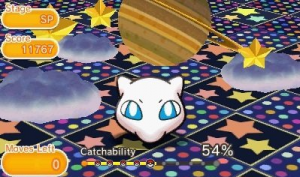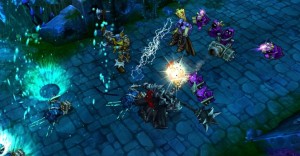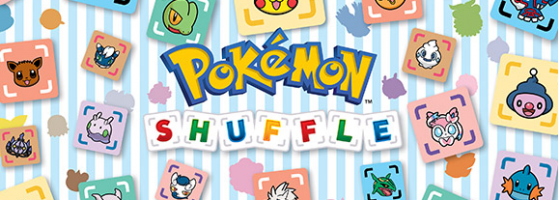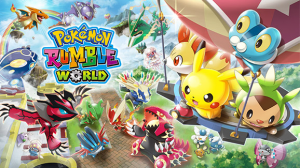Even though we haven’t seen the full impact of the Nintendo/DENA mobile partnership, that hasn’t stopped Nintendo from going the Free to Play option on the 3DS store or what they have dubbed: Free to Start. We’ve seen two games come from this line, both based on Pokémon and despite Nintendo’s great game design in other titles; they’ve gone for the worse of the worse F2P elements.
Pokémon Shuffle:
Let’s start with the first game Pokémon Shuffle. The concept is that you do battle against Pokémon in similar form to the Puzzle Quest series. The Pokémon that you bring in to fight become pieces on the board and matching three or more of the same Pokémon will clear them and do damage. Advanced play involves making use of special effects from certain Pokémon and mega evolution. You need to reduce the Pokémon’s health down to 0 before you run out of moves.
Beating a stage will give you a chance to capture the Pokémon with your chance broken down into a percent. This percent is based on the difficulty of the Pokémon and how many extra turns you had remaining. If you don’t catch the Pokémon, you can upgrade your Poke Ball using in game currency which more can be bought using the premium currency of diamonds. You can also buy special items to help you before a match and in game currency can be earned by checking in daily with the game’s server.
On top of that, Pokémon Shuffle features pay or wait elements with an energy meter. You start the day with five hearts and for every match you play, it costs one heart. Recovering hearts happen once every 30 minutes or you can spend some diamonds to recover.

Pokemon Shuffle uses monetization for extra turns as a means to acquire some of the harder to find Pokemon
In fact, diamonds as a recovery system is a trend throughout Nintendo’s Free to Start mantra. If you run out of turns during a match, you can spend a few diamonds to get more or get more in game resources to use the better Poke balls or items.
To be fair, you do receive diamonds slowly by checking in sometimes and for getting further into the game, but it will always be far less than what you need to make consistent purchases.
Before we talk about some of the problems with Shuffle, let’s talk about the other Free to Start offering that also has Pokémon in it.
Pokémon Rumble World:
Where Pokémon Shuffle was a puzzle game, Rumble World is an action title with the colorful cast of Pokémon. The hook is that all the Pokémon are actually windup toys that you collect across multiple lands. You can buy hot air balloons that take you to the various Pokémon grounds by using diamonds which are also Rumble World’s premium currency. Here, diamonds are unlocked for inviting friends to your town and completing boss quests and of course by spending real money.
Each balloon takes you to one of three areas which you have to stop a marker that decides what level you’ll go to.
Once there, combat is very basic with a two attack system for every Pokémon. While you’ll collect the same Pokémon, each toy has different stats and possible abilities.
If a Pokémon is close to being defeated, you’ll need to swap it out for another toy before it dies or the quest will be over unless you spend some diamonds to revive them. Win or lose, when you return to the home town the hot air balloon you used will be inaccessible for a select period of time unless you spend diamonds. To make things take longer, the timer goes up as you rise in ranking and unlock new areas to explore.
Now that we’ve talked about both games, it’s easy to see that free to start just means being about taking as much money from the consumer as possible.
Monetization Practices:
Nintendo’s entries into the free to play genre are examples of the worst kind of monetization — Where the game is designed to take as much money from the player instead of providing a great experience that’s worth it. This is the antithesis of games like League of Legends or Path of Exile where the developers wanted to create a fleshed out game that works without monetization, and then offer it as an option for more content for the player.
The games I talked about in this article are not designed to provide a better experience as the player gets farther into them but to become more price demanding with increased costs. In other words, the games punish the player for playing instead of becoming a better experience. There’s simply no hook to keep playing as the base gameplay never changes but the developers expect you to pour more money into the game or wait even longer between plays.

League of Legends and other great F2P offerings are about providing a great game first and then monetizing content, not the other way around
In a recent post about games that let you earn premium currency through play, I talked about how these games reward expert players by being able to enjoy them while spending less money, as they earn enough through playing.
But free to play games like Farmville, mobile games and Nintendo’s simply raise the cost of playing without improving the experience.
At no point did the gameplay or challenge grow over the hours I spent, just the amount of time it needed to keep progressing; I know that some of you are ready to comment by saying, “what did you expect for a free game?” The problem is that I expect a lot considering the pedigree of Nintendo and examples of well done free to play games.
Monetized Mario:
“Free to Start” is Nintendo’s attempt to get in on the casual/F2P market, but consumers are already wise to shady F2P practices and monetization methods. Instead of looking at Farmville, Candy Crush Saga etc, they should be paying close attention to games that have gone the free to play route without sacrificing gameplay; titles that are great experiences without spending money and the monetization simply makes things better but is not required.
One of Nintendo’s major advantages has always been their branding of characters; putting their best brands in low grade F2P games is not a smart move for them to break into a new market with. Hopefully DeNA will have better ideas for their partnership games or this will turn into another case of Nintendo being late to the party.



